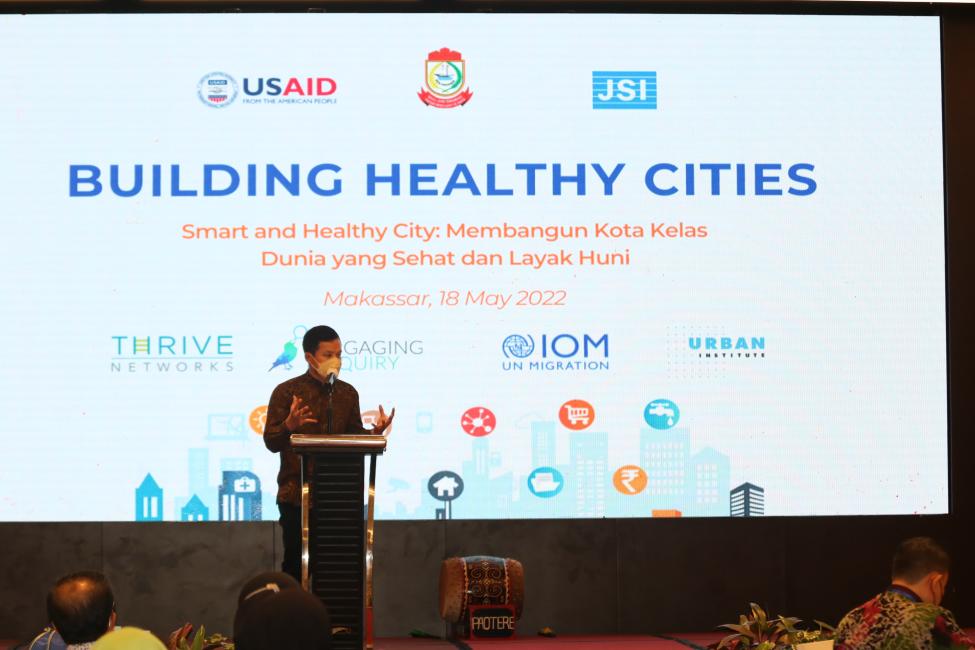-
Who We Are
WHO WE AREThe International Organization for Migration (IOM) is part of the United Nations System as the leading inter-governmental organization promoting since 1951 humane and orderly migration for the benefit of all, with 175 member states and a presence in over 100 countries. IOM has had a presence in Indonesia since 1979.
About
About
IOM Global
IOM Global
-
Our Work
Our WorkAs the leading inter-governmental organization promoting since 1951 humane and orderly migration, IOM plays a key role to support the achievement of the 2030 Agenda through different areas of intervention that connect both humanitarian assistance and sustainable development. Across Indonesia, IOM works on a wide range of activities in partnership with the Southeast Asian Government, civil society, and the donor community.
Cross-cutting (Global)
Cross-cutting (Global)
- Data and Resources
- Take Action
- 2030 Agenda
USAID-funded Building Healthy Cities Project Successfully Held a Healthy and Smart City Conference in Makassar on May 18, 2022
Makassar is an important and busy seaport in Eastern Indonesia with over 1.6 million residents and a strong economy attracting migrants from the surrounding areas. In providing services to its residents, Makassar has made tremendous strides notable for being the five-time recipient of the highest awards for the Swasti Saba Wistara, or Healthy City Program, as well as winning several awards for innovation and smart cities achievements. Nonetheless, urban challenges especially those related to citizens’ health and well-being persisted. In addressing some of these issues, the USAID-funded Building Healthy Cities (BHC) project has been working with Makassar City since 2017 to refocus city policies, planning, and services with a health equity lens while improving data-driven decision making for the benefit of city residents.
As Building Healthy Cities comes to a close, the project held a Healthy and Smart City Conference in collaboration with the city’s Planning Agency (Bappeda). The conference shared the accomplishments of this partnership from the last five years, and recommendations for what other Smart Cities in Indonesia might be able to replicate for their own healthy city efforts. The project has highlighted the complexity of urban health, especially in a rapidly growing city like Makassar. Building Healthy Cities helped Makassar to address data-driven decision making, waste management, maternal and child health, citizen reporting system, noncommunicable disease data analysis, and finally develop coherent action for the healthy city of Makassar. The Mayor of Makassar, together with BHC, also officially launch the Healthy City Data Integration System, called Sehatta’Mi in the local language, which allows decision-makers to conduct cross-sector data analysis and support comprehensive data analysis for effective and efficient decision-making.

The event was held on Wednesday, May 18th at the Rinra Hotel. Speakers included the Smart City Advisor, Ministry of Information and Communication of Indonesia; Mayor of Makassar; Head of Data and Information Center (Pusdatin), Ministry of Health; USAID representatives; and Healthy City Program, Ministry of Health. Knowledge and experiences will also be shared from other Smart Cities and Healthy City-related projects in Indonesia including Jakarta and Kotaku.
Building Healthy Cities has made key strides towards making Makassar a healthier, more equitable city and contributed toward meeting the 2030 Agenda for Sustainable Development Goals of Good Health and Well-Being, Reduced Inequalities, Sustainable Cities and Communities, and Partnership for the Goals; however, these efforts need to be scaled up across all districts in the city. Building Healthy Cities is confident that with this plan and new partners, Makassar can take a leadership role in guiding other cities toward healthy urban planning.

Building Healthy Cities (BHC) is a five-year cooperative agreement funded by the United States Agency for International Development (USAID) under Agreement No. AID-OAA-A-17-00028, beginning September 30, 2017. BHC is implemented by JSI Research & Training Institute, Inc. (JSI) with partners International Organization for Migration, Thrive Networks Global, and Urban Institute, and with support from Engaging Inquiry, LLC. This Project is made possible by the generous support of the American people through USAID. USAID administers the U.S. foreign assistance program providing economic and humanitarian assistance in more than 100 countries worldwide.
For more information, please contact:
Dr. Ahmad Isa, MPH, BHC Project Officer: aisa@iom.int
For interview requests, please contact:
Ariani Hasanah Soejoeti, Media & Communication Officer: aseojoeti@iom.int
